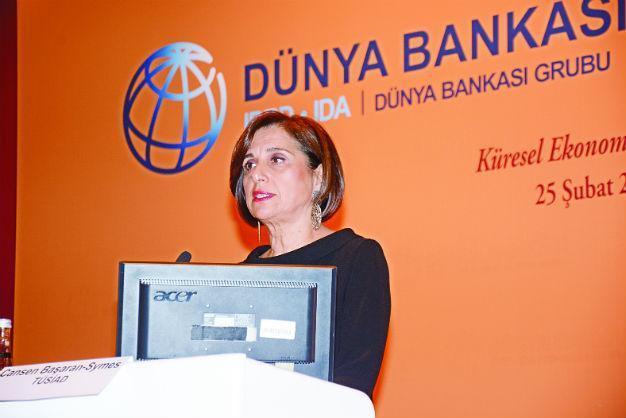Top bosses ‘failing to understand’ Central Bank’s inflation policies
ISTANBUL

The head of Turkey’s top business organization has said the continuing rising trend in the inflation rate was not good for the country, while business representatives were “failing to understand” the Central Bank’s policies in maintaining the price index.
“We have always underlined the importance of the realization of the inflation targets by the Central Bank. The inflation rate has, however, not only been higher than the targets, but has also continued increasing. At the same time, the Central Bank’s policies are away from achieving the bank’s own targets. There is a difference between setting inflation targets and making this a part of monetary policy. There has recently been a tendency that sees it as enough to have a target. We have been wondering whether an impossible-to-reach target has been set. Or is there any obstacle before the realization of the policies which are necessary to achieve the goal? I should sincerely say that we are failing to understand this,” said the president of the Industry and Business Association of Turkey (TÜSİAD), Cansen Başaran-Symes, at a joint meeting with the World Bank on Feb. 25.
Inflation was announced 8.81 percent in 2015, much higher than the Central Bank’s target of 5 percent. The inflation rate then rose by 1.82 percent in January, triggered by persistently high food costs and tax hikes, especially on alcoholic beverages and tobacco products, lifting the annual inflation rate to 9.58 percent, close to double digit levels and the highest since May 2014. The Central Bank increased its inflation forecast rate in January by one point from 6.5 to 7.5 for 2016, having kept its “5 percent target” for the following three years.
Symes noted global risks have continued to rise, including slowing global economic recovery and the deterioration in emerging economies, at the launch of the “Global Economic Prospects: Spillovers amid Weak Growth” report in Istanbul.
“We have seen the Syrian issue has been deepening and a dramatic rise in terror attacks across the globe, including Turkey. The geopolitical risks have unfortunately skyrocketed,” she said, adding that the oil plunge has destabilized many countries.
The World Bank’s country director for Turkey, Johannes Zutt, said the bank had expected a worse performance from the Turkish economy last year due to an intensive election cycle, but Turkey did much better than expected as its public and private sectors were robust, as quoted by Anadolu Agency.
Zutt said lower oil prices and the recovery in the European markets will positively affect Turkey, but there will be some risks ahead of the Turkish economy amid the rate hike move by the U.S. Federal Reserve (Fed).
The report said the global economy will need to adapt to a new period of more modest growth in large emerging markets, characterized by lower commodity prices and diminished flows of trade and capital.
“In the current environment, developing countries need to brace for possible shocks by building resilience to risks to growth. Where they are able to boost government spending or lower interest rates, they can provide support to economic activity. They can further encourage investor confidence with reforms to governance, labor market functioning and business environments. Measures to absorb young workers or to increase workforce participation will relieve demographic pressures in many countries,” warned the report.
 The head of Turkey’s top business organization has said the continuing rising trend in the inflation rate was not good for the country, while business representatives were “failing to understand” the Central Bank’s policies in maintaining the price index.
The head of Turkey’s top business organization has said the continuing rising trend in the inflation rate was not good for the country, while business representatives were “failing to understand” the Central Bank’s policies in maintaining the price index.